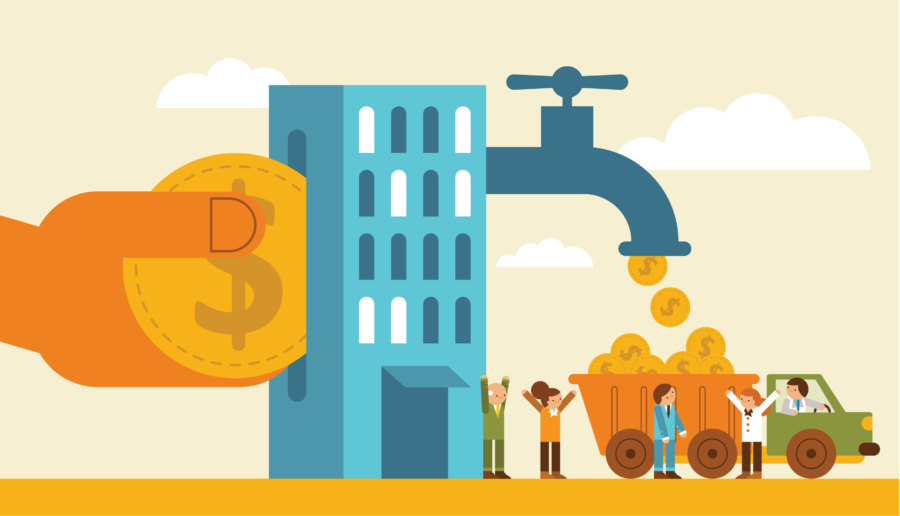Investing in commercial real estate may seem like a daunting task, but if done right, it can offer one of the best income streams in the real estate world. How do you get started in Decatur, Alabama or anywhere else in the country? We at Parker Real Estate are here to offer some important tips.
Commercial Versus Residential Real Estate
The difference between commercial and residential real estate is simple. While residential real estate is leased out to tenants who are living on the property, such as in a home, commercial real estate is leased out to businesses and multifamily complexes, who pay rent to the owner while they operate. Also included in commercial real estate is land purchased for the purpose of development.
There are multiple types of commercial real estate that can turn a good profit.
-Retail Space. Perhaps the most obvious type of commercial real estate, retail space is meant for businesses to operate. Strip malls, restaurants, and banks are all good examples. Most of these properties range from 5,000 to 350,000 square feet.
-Office Space. Ranging from single offices to massive skyscrapers, office properties come in three types. These properties range from Class A, new office buildings in busy areas to Class C office buildings in need of redevelopment. Class A office buildings require the least capital investment and tend to be located in the best areas. Class B office buildings, a popular choice for investors, may need some minor infrastructure work but have the potential to deliver a good return on investment. Class C properties are best suited to redevelopment, as they’re often located in poor areas for business and tend to have a lot of vacancies.
-Multifamily Properties. These properties can include living spaces with more than one unit, typically over four, such as condominiums and apartment complexes. This is often a place where commercial real estate investors start. However, tenant turnover can be an issue, as their leases tend to be shorter than that of businesses.
-Special Purpose Properties. Sports arenas, storage facilities, and other properties meant for a specific purpose fall under this category. Many of these properties belong in the tourism and entertainment industry. However, some of these properties can have a variety of uses, such as a restaurant on one floor and apartments on the upper floor, making them a popular choice for investment.
-Industrial Real Estate. These properties house manufacturing operations and warehouses, and are often available for investment opportunities.
-Owner-Occupied Commercial Real Estate. If you plan to occupy or use the real estate you purchase yourself, it is owner-occupied. This can include any of the five types of real estate listed above.
The Benefits of Commercial Real Estate
Some benefits to owning such properties are obvious, such as stable cash flow from the rent businesses are paying to occupy your property. But there are some less obvious benefits to owning your own commercial properties.
-Businesses often have longer lease terms. In residential real estate, turnover is more frequent due to shorter lease terms, making cash flow more unstable. Businesses tend to sign lease agreements for more than one year at a time, leading to more stability in the long run.
-More Return on Investment. While investing in residential properties tends to yield you about one to four percent return on investment, commercial properties can yield an impressive six to twelve percent. And due to having longer lease terms, commercial real estate offers a lower vacancy risk.
-Consistent Stream of Income. Again, the fact that businesses rent your properties for longer lease periods means less tenant turnover is less of an issue than in residential properties. In a triple net lease, the tenant must also pay property taxes, insurance, and any costs to maintain the premises, adding to your bottom line. Also, you’ll tend to have more units you can rent out than you would if you were dealing with residential real estate.
-You Have Fewer Competitors. Many view commercial real estate investing as difficult, giving you fewer competitors in the market.
Ready to Get Started? What You Should Know
Of course, you’ll need to do your homework before you invest in any commercial real estate, as this market is different than residential. Following these tips will greatly improve your chances of success.
-Commercial Is Not Residential Real Estate. Usable square footage is vital to how much income you can make from a commercial property, as is its location (is the property in a good area for a specific type of business?) and what tenants will want to operate out of your property. You’ll want to rent out space for restaurants, banks, and offices in a busy urban area rather than in a small town. Follow the demand.
-Analyze your “comps.” Comps, short for comparables, are properties similar to one you’re looking to buy. Look at properties with square footage no bigger or smaller than 10 percent of the one you wish to buy. Take some time to study what they’re selling for and you’ll get a good idea of what your property will be worth.
-Get Out The Calculator. Now it’s time to determine your net operating income–that is, your income before taxes. Subtract all operating expenses from your income to get this number. Operating expenses include taxes, utilities, cleaning crews, other fees, and maintenance.
Now that you have this number, determine your cap rate by taking a ratio of your net operating income and your property asset value. This should give you an idea of how much money your property will make in the future.
Finally, if you need to finance the purchase of your commercial property, you’ll need to determine another metric called cash on cash. This is a rate of return based on your commercial transactions. Basically, it measures your rate of return based on what you financed out of pocket versus what you financed.
Getting the Commercial Loan
 There are a multitude of loans available to the commercial real estate investor. Spend some time thinking about what you want out of your financing. Do you want a lower interest rate and are fine paying off your loan over a longer period of time? Or do you need a lower down payment to get started? Small business loans, conventional loans, and hard money loans are just a few of the options available. So, what knowledge do you need to understand the process?
There are a multitude of loans available to the commercial real estate investor. Spend some time thinking about what you want out of your financing. Do you want a lower interest rate and are fine paying off your loan over a longer period of time? Or do you need a lower down payment to get started? Small business loans, conventional loans, and hard money loans are just a few of the options available. So, what knowledge do you need to understand the process?
-Should you finance as an entity or individual? Most of the time, commercial loans are financed by entities such as business partnerships and corporations, but you can secure one as an individual. Of course, you’ll need to show that you can pay back the loan.
-Know The Difference Between Residential And Commercial Loans. Commercial loans typically range from five to twenty years, rather than fifteen to thirty years, and are not backed by the government. But like with residential loans, a lender will want to know your credit history, so work on making payments on time and maintaining a good credit score.
-Know what the LVT is. The Loan to Value ratio is a number your lender will calculate. Your lender will divide the value of the loan by the property’s purchase price or appraisal amount to get this number. You should get a number between 65 and 80 percent, with the lower part of the spectrum being favorable for better financing rates.
-What is the DSCR? This is your debt service coverage ratio, and tells the lender how well your property will pay off your debt. This number compares your yearly net income to your yearly debt (including interest) and should be over one percent to indicate positive cash flow. You’ll want to have a DSCR of over 1.25 percent to get a loan.
Conclusion
Commercial real estate investing does not have to be as difficult as you think. Now that you’re armed with the basic understanding of how it works, contact us to get started today.


